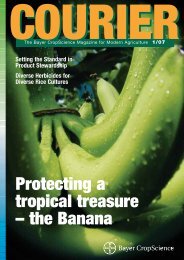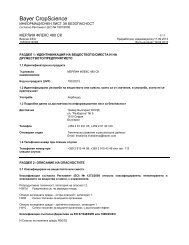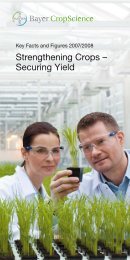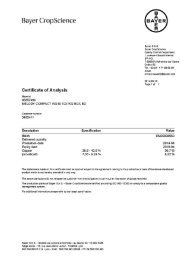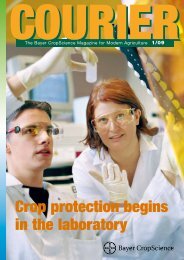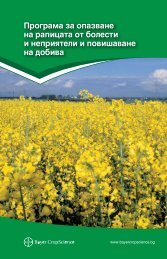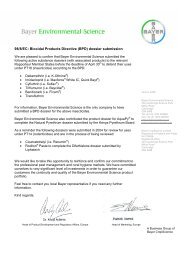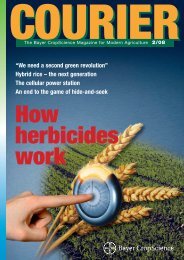For healthy potatoes - Bayer CropScience
For healthy potatoes - Bayer CropScience
For healthy potatoes - Bayer CropScience
Create successful ePaper yourself
Turn your PDF publications into a flip-book with our unique Google optimized e-Paper software.
Confidor ® is the world’s leading agricultural<br />
insecticide, registered in over 120 countries<br />
and more than 140 crops. It is the key product<br />
of the commercially most important class of<br />
insecticides emerging during the last 20 years,<br />
the chloronicotinyls or CNIs (syn. Neonicotinoids).<br />
Confidor controls a wide range of sucking and<br />
biting insects with low application rates and<br />
long-lasting efficacy.<br />
A new oil-based formulation technology,<br />
named OTEQ ® , now makes it even more<br />
effective and more robust to unfavorable<br />
weather conditions. New research shows<br />
that it actually helps plants to better cope<br />
with abiotic stress situations. That makes<br />
Confidor a reliable and all-around player<br />
in the agricultural world of insecticides for<br />
the upcoming years.<br />
Confidor is the world’s best selling<br />
insecticide and number one <strong>Bayer</strong> Crop-<br />
Science product. Including seed treatment<br />
and environmental science uses, it generated<br />
€587 million in sales in 2005.<br />
Launched in 1992, it became global market<br />
leader five years later, thanks to the<br />
innovative mode of action of its active<br />
ingredient, imidacloprid, its excellent efficacy<br />
and environmental profile and its versatility.<br />
In the seed treatment segment (when<br />
applied to seeds) the product is marketed<br />
under the trademark Gaucho ® .<br />
Flexible application technology<br />
Confidor offers excellent root systemic<br />
efficacy and plant compatibility. The optimum<br />
usage of these properties can be<br />
obtained by application methods which<br />
work via the root system such as drench,<br />
drip irrigation, in-furrow and float systems.<br />
The stem application of Confidor is<br />
commonly used in crops like citrus and<br />
hops. Confidor also offers good residual<br />
efficacy as a foliar spray. By spraying to<br />
leaves or drenching to roots, stems or<br />
trunks Confidor can be used in more than<br />
140 crops and requires fewer applications<br />
than some competitor products.<br />
In 2006 <strong>Bayer</strong> <strong>CropScience</strong> launched a<br />
unique new formulation technology making<br />
its active ingredient even more effective<br />
against sucking insects. Confidor<br />
OTEQ ® is a patented formulation, ensuring<br />
improved foliar adhesion, better penetration<br />
and enhanced rainfastness.<br />
And there’s more. Over the years, farmers<br />
worldwide have noticed that plants treated<br />
with Confidor looked healthier. In 2005,<br />
independent research proved that the product<br />
not only controls insects, but also acts<br />
as a Stress Shield.<br />
Biotic and abiotic stress factors<br />
Plant growth and productivity as well as<br />
the product quality are greatly influenced<br />
by environmental stresses to which plants<br />
are continuously exposed. The optimal<br />
growth and development is far from that<br />
realized in the field or greenhouse.<br />
A major proportion of yield losses in<br />
crop plants is due to so-called abiotic stress<br />
factors, which occur as e.g. drought, flooding,<br />
heat, cold, excessive light, high salt<br />
concentration in soil or ozone in air, to<br />
name a few. There is another group of stressors<br />
namely fungi, bacteria, viruses and<br />
herbivores (insects) causing ‘biotic’ stress.<br />
When record yields are compared with<br />
average yields, the impact of the environment<br />
on plant productivity becomes apparent.<br />
If record yields can be assumed to represent<br />
plant growth under ideal conditions,<br />
then the losses associated with biotic and<br />
abiotic stresses can reduce the yield potential<br />
by up to 80%. Most of the losses are<br />
attributed by far to suboptimal growing conditions<br />
in the environment, i.e. abiotic stress.<br />
2/06 COURIER 7





